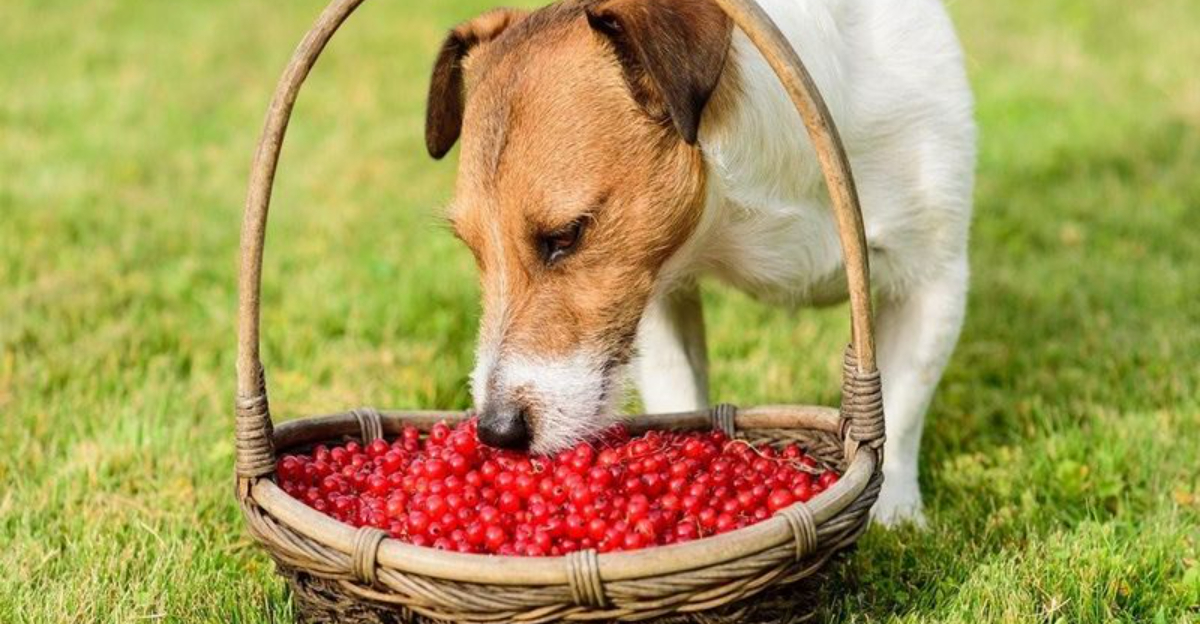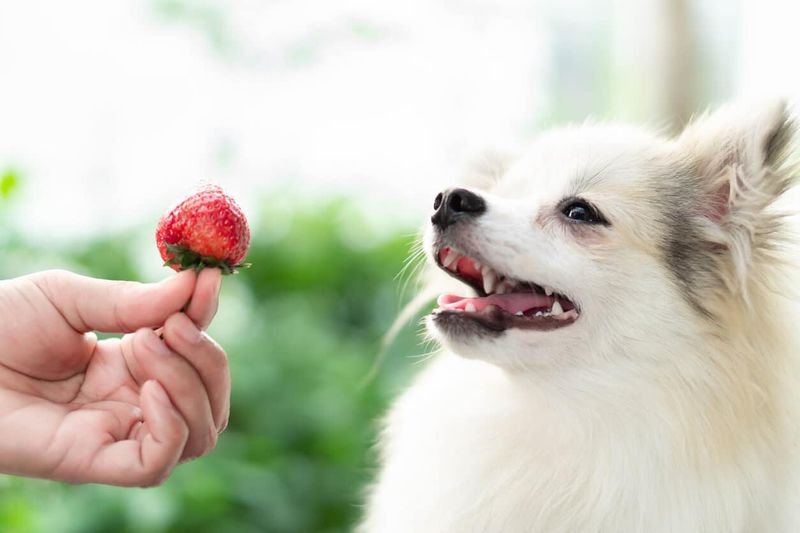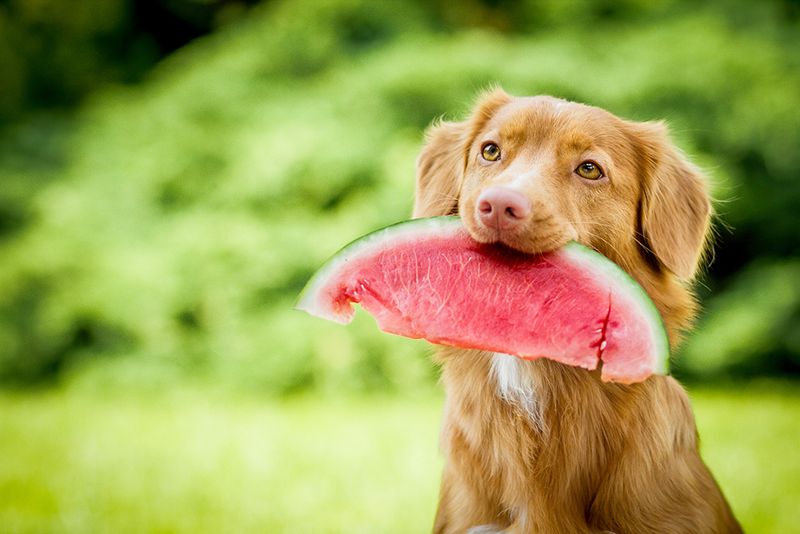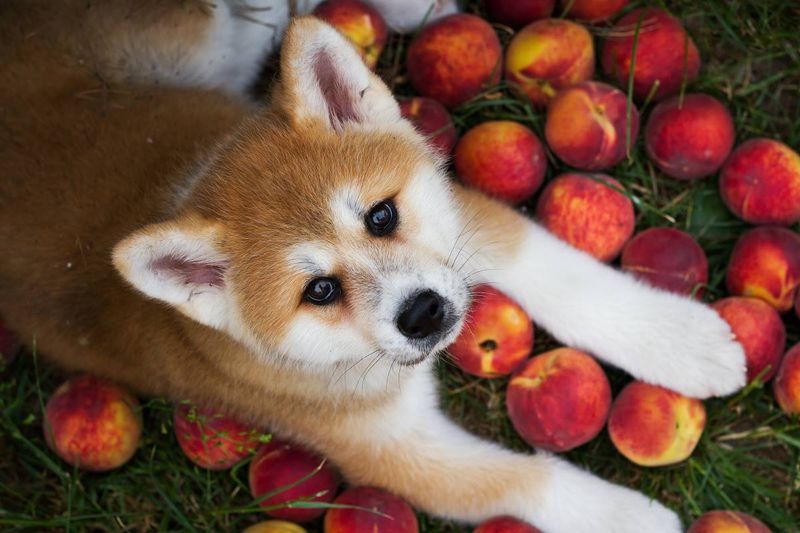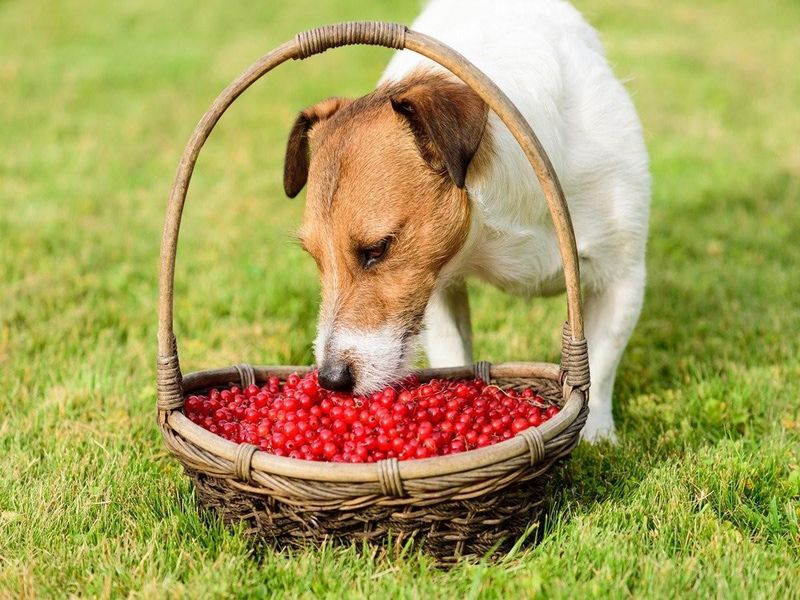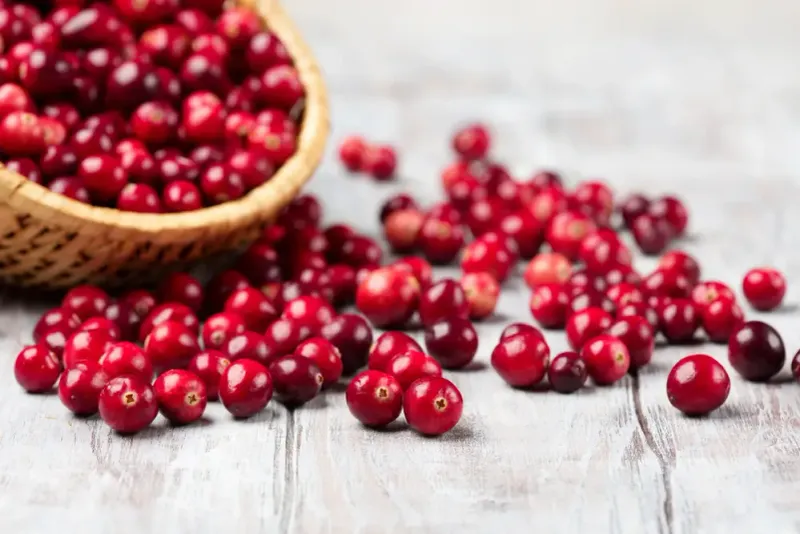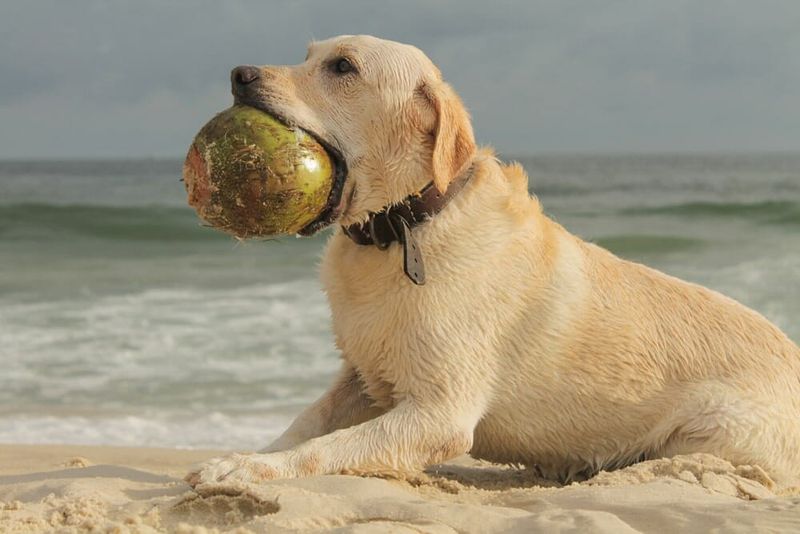Navigating the world of treats for your furry friend can be tricky. While some fruits are perfectly safe, others can be downright dangerous. Knowing which fruits fall into each category is crucial for any dog owner. This guide will walk you through the fruits you can safely share with your canine companion, as well as those best avoided.
Apple
Apples are a crunchy delight for dogs. Packed with vitamins A and C, they can boost your dog’s immune system. Some dogs appreciate the crisp texture, and it can help clean their teeth. Always remove the seeds and core as they contain cyanide, which is harmful in large quantities. Apples can be served sliced or as small chunks.
Did you know? The apple tree is a member of the rose family, Rosaceae. Offering this sweet treat occasionally can be a refreshing addition to your dog’s diet. If your dog loves to munch, an apple might be the snack they crave.
Banana
Bananas offer a sweet and creamy treat for dogs. Rich in potassium and fiber, bananas can support heart and digestive health. Dogs might enjoy them mashed or sliced as a training reward.
However, moderation is key because of their sugar content. Fun fact: Bananas are technically berries! Sharing a few banana slices can be a delightful surprise for your canine friend. Remember, while appealing to dogs, too much banana can lead to constipation. So, keep it balanced and enjoy watching your dog relish this tropical delight.
Blueberries
Blueberries are tiny powerhouses of antioxidants. Packed with vitamins C and K, they support your dog’s immune system and bone health. Their small size makes them a perfect low-calorie treat. Frozen blueberries can also be a refreshing snack on a hot day.
Did you know? Blueberries have been around for over 13,000 years. Dogs usually enjoy these tangy bites, which can be an excellent addition to their regular diet. Try tossing a few to your dog during playtime for an interactive and healthy snack session.
Strawberries
Strawberries are sweet and juicy, ideal for dogs seeking something fruity. Loaded with vitamin C, they contribute to a shiny coat and robust immune system. Dogs usually enjoy them sliced or mashed.
Did you know? Strawberries are the only fruit with seeds on the outside. While they can be a delightful treat, remember that moderation is crucial because of their sugar content. Sharing a few strawberry pieces can be a fun way to bond with your pet. Always wash them thoroughly before serving to ensure they are free from pesticides.
Watermelon
Watermelon is a hydrating treat, especially during hot summer months. Consisting of 92% water, it’s excellent for keeping your dog hydrated. Rich in vitamins A, B6, and C, watermelon can support a healthy immune system.
However, be sure to remove the seeds and rind, as they can cause intestinal blockage. Fun fact: Watermelons were first harvested in Egypt over 5,000 years ago. Offering a seedless slice can be a fun way to cool down your dog. Watch them enjoy this refreshing and juicy treat while lounging in the sun.
Pineapple
Pineapple is a tropical treat packed with vitamins and minerals. Its sweetness comes from natural sugars, and it’s a great source of vitamin C, which boosts immunity. Dogs might find the taste refreshing, especially when it’s chilled on a warm day.
Be cautious with portions due to its sugar content. Fun fact: Pineapples take about two years to grow. Remove the tough core and spiky skin before serving. Your dog will likely enjoy the juicy tidbits. This unique fruit can add variety to their diet and make treat time more exciting.
Peaches
Peaches can be a juicy and sweet snack for dogs. They are rich in vitamin A, which supports eye health. Dogs may enjoy them sliced, but it’s essential to remove the pit, as it contains cyanide and poses a choking hazard.
Did you know? Peaches originated in China and are a symbol of immortality in Chinese culture. Sharing a peach slice occasionally can be a delightful treat for your dog. This stone fruit can be a refreshing addition to their diet when served in moderation. Ensure the peach is ripe and washed before offering.
Pears
Pears make a sweet and crunchy snack for dogs. Loaded with fiber and vitamin C, they aid in digestive health and bolster immunity. Always remove the seeds and core, as they can be harmful.
Fun fact: Pears have been cultivated for more than 4,000 years. Dogs might enjoy them sliced or as small chunks. Offering pears occasionally can be a tasteful addition to their diet. Ensure the pears are fresh and ripe to provide maximum enjoyment for your furry friend. They can be a delightful treat for dogs who enjoy sweet flavors.
Raspberries
Raspberries offer a tart and sweet snack for dogs. Low in sugar and calories, they are a healthy treat option. Rich in fiber, they support digestive health, while antioxidants help combat inflammation.
Did you know? Raspberries belong to the rose family. Dogs often enjoy them fresh or frozen, making them a versatile treat. However, moderation is key as they contain xylitol, which can be harmful in large amounts. A handful of raspberries can be a refreshing addition to your dog’s treat collection, adding variety and excitement to snack time.
Cantaloupe
Cantaloupe is a refreshing and sweet treat for dogs, especially during summer. Rich in vitamins A and C, it supports vision and boosts immunity. Dogs enjoy its juicy texture and natural sweetness.
Be sure to remove the seeds and rind before serving, as they can cause digestive issues. Fun fact: Cantaloupe was first cultivated in the 1700s in Europe. Offering a slice can be a hydrating treat for your dog. This melon is a delightful way to keep your furry friend cool and happy on a hot day.
Mango
Mangoes are a tropical delight for dogs. Rich in vitamins A, B6, C, and E, they provide a nutritional boost. Dogs often enjoy the sweet and juicy flavor of ripe mango.
It’s important to remove the pit, as it can pose a choking hazard. Did you know? Mangoes originated in South Asia over 4,000 years ago. Offering a mango slice occasionally can be a special treat for your dog. Their vibrant flavor and rich texture make them a fun addition to your dog’s diet. Just ensure the mango is ripe and peeled.
Cranberries
Cranberries bring a tart and tangy treat to the table for dogs. Known for their antioxidant properties, they contribute to urinary tract health. Dogs might not love their tartness plain, but mixed with food, they can be an enjoyable addition.
Fun fact: Cranberries are one of the few native fruits to North America. Offering cranberries occasionally can provide variety in your dog’s diet. Ensure they are cooked or dried, as fresh cranberries can be too sour. This fruit can be a healthy, occasional treat that supports well-being.
Oranges
Oranges can be a zesty and juicy treat for dogs. They are rich in vitamin C, which can boost the immune system and support overall health. Dogs might enjoy the sweet and tangy flavor.
However, it’s essential to remove the seeds and peel before serving. Did you know? Oranges are a hybrid fruit, combining pomelo and mandarin. Offering a few orange segments can be a refreshing treat for your dog. Be mindful of the quantity, as too much citrus can lead to digestive upset. Enjoy watching your dog revel in this citrus delight.
Grapes
Grapes are highly toxic to dogs, and even a small amount can lead to serious health issues like kidney failure. It’s crucial to keep them out of reach and avoid offering them as treats. Grapes, along with raisins, can be life-threatening.
Did you know? The exact toxin in grapes affecting dogs remains unidentified. Despite being a healthy snack for humans, grapes must be strictly avoided in a dog’s diet. If ingestion occurs, immediate veterinary care is essential. Keeping grapes away from dogs ensures their safety and well-being.
Cherries
Cherries, while tempting, are a no-go for dogs. The pits, stems, and leaves contain cyanide, which is harmful. Even in small quantities, cherries can cause upset stomach or more severe symptoms.
Fun fact: Cherries belong to the same family as plums and peaches. Dogs should steer clear of this fruit to avoid potential hazards. If you suspect your dog has ingested cherries, consult a vet promptly. Keeping cherries off the menu ensures your dog stays safe and avoids unnecessary health risks. This vibrant fruit is best avoided altogether.
Avocado
Avocados are not safe for dogs. They contain persin, a fungicidal toxin that can cause vomiting and diarrhea in dogs. The pit also poses a significant choking hazard.
Did you know? Avocados originate from south-central Mexico. Despite being a nutritious option for humans, they should be kept away from dogs. Consuming avocado can lead to serious health issues. Keeping this creamy green fruit out of your dog’s reach is vital for their safety. It’s always better to stick with fruits that are proven safe for canine consumption.
Tomatoes
Tomatoes are not entirely safe for dogs, especially unripe ones and the plant part. They contain solanine, which can be toxic. While ripe tomatoes are less harmful, it’s best to avoid them.
Did you know? Tomatoes belong to the nightshade family. Although a staple in human diets, tomatoes pose risks to dogs. If ingested, they can cause gastrointestinal upset. Ensuring tomatoes are not within reach can prevent unnecessary health concerns. It’s wise to focus on fruits that are safe and beneficial for your furry friend.
Lemons
Lemons might seem harmless, but their high acidity can lead to digestive discomfort in dogs. The peel contains essential oils that are toxic to dogs.
Did you know? Lemons are a hybrid between a sour orange and a citron. While they can be a refreshing flavor enhancer for humans, they should be avoided for dogs. Consuming lemons can result in an upset stomach or more severe reactions. Keeping lemons out of reach and opting for dog-friendly fruits ensures your pet’s well-being and happiness.
Coconut
Coconut may seem exotic and appealing, but it’s best kept away from dogs. It contains medium-chain triglycerides, which can cause stomach upset and discomfort. The husk is also a choking hazard.
Did you know? Coconuts are a staple in tropical cuisines. Despite their benefits for humans, they can be troublesome for dogs. Offering coconut can lead to digestive issues, so it’s better to choose safer options. Keeping coconut products out of your dog’s diet ensures their safety and comfort. This tropical fruit is best avoided for canine health.
